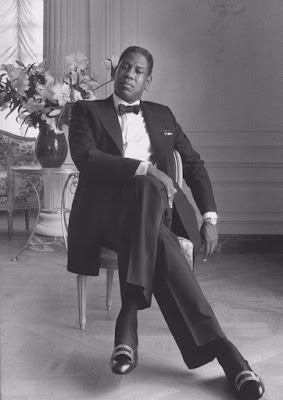Uncle Andre
Before the advent of social media there were magazines. As a younger woman I eagerly anticipated the latest issue of US Weekly hitting the newsstands and waited anxiously for the mail woman to deliver my copies of Allure, Essence, and Vibe. Magazines were my escape; my source of fashion advice, beauty tips, and celebrity gossip. I first took notice of Andre Leon Talley in his Life With Andre column in Vogue. Although, Mr. Talley rarely covered black people, I admired the way he joyfully took up space in the white dominated world of high-fashion. Who doesn't love a man who wears jewel-toned capes and kaftans?
A few months ago I watched The Gospel According to Andre, and was pleasantly surprised that, contrary to my expectation, Talley seemed so black identified. He recalled his southern upbringing, described the high expectations he benefitted from in the segregated schools he attended, and reunited with former friends and teachers. He had lunches with Tamron Hall and talked about attending Abyssinian Baptist Church in Harlem. Although the film is about Talley's contribution to the fashion industry, the 2016 election looms in the background. It is clear how triggering Donald Trump's candidacy was for him as a black man who had grown up during segregation.
When I saw that Talley was releasing a (second) memoir called The Chiffon Trenches, I downloaded it onto my Kindle. As I read late into the night I had to message my college classmate, Jackie, who was also reading it, to process the levels of vulnerability, pain and dysfunction in this narrative. The book begins in North Carolina where Talley describes his close relationship with his grandmother after abandonment by his parents. Although he doesn't describe what it was like to grow up gay in the South in the 1950's and 60's, he does discuss being sexually assaulted by neighbors. We learn about his success in high-school and college, culminating with a M.A. from Brown University. The majority of the book is about his experiences in the fashion world, interestingly presented outside of the social and historical context of the Civil Rights Movement, The Black Power Movement, The Women's Liberation Movement, or The Gay Rights Movement.
 |
| ALT 1989 |
Rarely do I read a memoir and like a person less than I did before reading it, but this book left me profoundly disturbed. As we discussed The Chiffon Trenches, Jackie kept saying "I have never read a book like this before," and it's true. Talley is revealing without being self-reflective. He doesn't seem to understand that the people who he liberally name-drops WERE NOT HIS FRIENDS. From the outside looking in it seems as if many in the fashion industry regarded him like a circus curiosity, a black man who spoke French and was well versed in the language of fashion, but was not a fully formed person apart from them. He was the 'black friend' the fashion elite needed in order to appear relevant in the 1970s; the 'black friend' who never talks about race, and re-affrims white superiority through copious genuflections. But what does Talley have to show for his years of loyalty?
The thread that pulls the reader through the book is the gradual disintegration of Talley's relationships with members of the fashion elite. What is strange about this story is how intensely Mr. Talley seems to seek the approval of those who have rejected him. He attaches himself to figures like Anna Wintour and Karl Lagerfeld as if they were surrogate parents and then has a difficult time accepting the fact that they too have abandoned him. It is heartbreaking to witness Talley attempting to justify continuing to attend Wintour's Chanel fittings after she dropped him and desperately writing about his hopes for deathbed reconciliation with her. He acknowledges the role that his weight may have played in his banishment, but it doesn't seem to understand that if you are a show pony you have to look the part; you can't be rolling though the airport in a wheel-chair.*
The Gospel According to Andre and The Chiffon Trenches are two very different portraits of a complicated man; a man whose over-the-top persona may be equal parts confidence, insecurity, and bluster. Although my instinct may be to feel angry at him or sorry for him, that trinity of emotions is how many of us survive, and hopefully thrive, in America.
*Since Wintour's vague apology about the lack of diversity and racial sensitivity at Vogue, Talley has called her a "colonial broad," which seems to represent some recognition on Talley's part that they are not getting back together.


Comments
Post a Comment